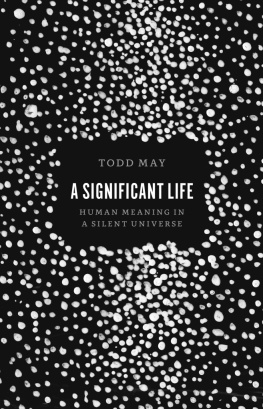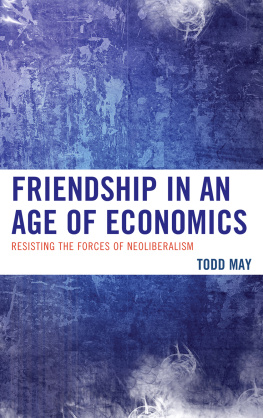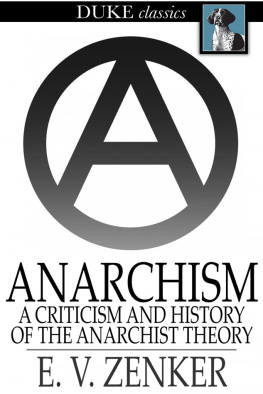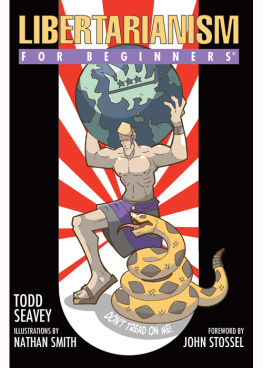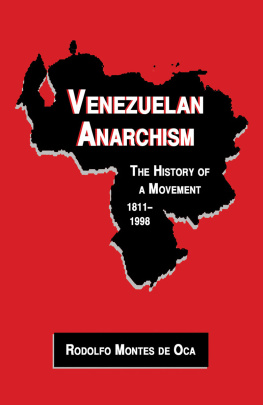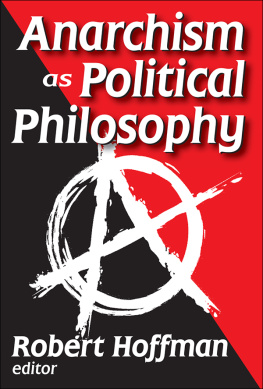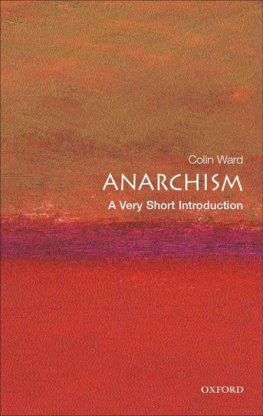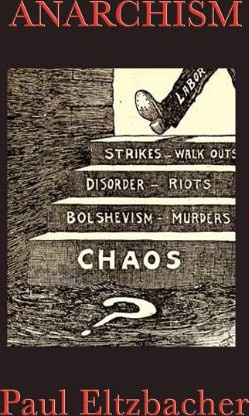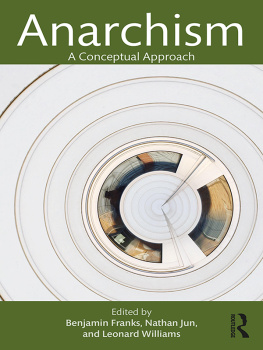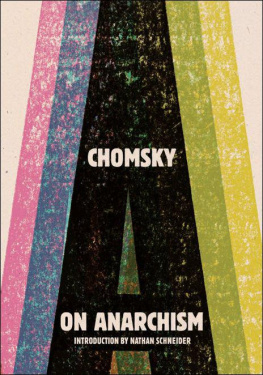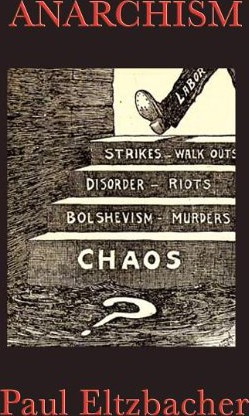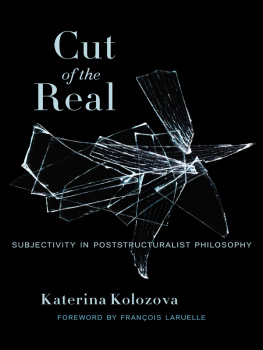Todd May - Political Philosophy of Poststructuralist Anarchism
Here you can read online Todd May - Political Philosophy of Poststructuralist Anarchism full text of the book (entire story) in english for free. Download pdf and epub, get meaning, cover and reviews about this ebook. publisher: Pennsylvania State University Press, genre: Politics. Description of the work, (preface) as well as reviews are available. Best literature library LitArk.com created for fans of good reading and offers a wide selection of genres:
Romance novel
Science fiction
Adventure
Detective
Science
History
Home and family
Prose
Art
Politics
Computer
Non-fiction
Religion
Business
Children
Humor
Choose a favorite category and find really read worthwhile books. Enjoy immersion in the world of imagination, feel the emotions of the characters or learn something new for yourself, make an fascinating discovery.

Political Philosophy of Poststructuralist Anarchism: summary, description and annotation
We offer to read an annotation, description, summary or preface (depends on what the author of the book "Political Philosophy of Poststructuralist Anarchism" wrote himself). If you haven't found the necessary information about the book — write in the comments, we will try to find it.
Todd May: author's other books
Who wrote Political Philosophy of Poststructuralist Anarchism? Find out the surname, the name of the author of the book and a list of all author's works by series.
Political Philosophy of Poststructuralist Anarchism — read online for free the complete book (whole text) full work
Below is the text of the book, divided by pages. System saving the place of the last page read, allows you to conveniently read the book "Political Philosophy of Poststructuralist Anarchism" online for free, without having to search again every time where you left off. Put a bookmark, and you can go to the page where you finished reading at any time.
Font size:
Interval:
Bookmark:



For Kathleen, David,
and Rachel
Preface
This book began as a conversation on a train headed from Pittsburgh to Washington to attend the Eastern Division meetings of the American Philosophical Association. I was trying to explain to a friend, Mark Lance, what the political theory of poststructuralism was all about. He listened more patiently than he should have and then said, "It sounds like anarchism to me." That comment was the seed of an article, "Is Post-Structuralist Political Theory Anarchist?"which appeared in Philosophy and Social Criticism in 1989and eventually of the present work.
I believe that people familiar with feminist theory will discover that much of the perspective developed here has resonances with feminism, and some may wonder why I have not discussed those resonances in the text. The explanation is simple, having to do with the limitations of my own expertise. It would take a grasp broader than my own to do justice to both feminism and poststructuralism at the same time. I must, therefore, leave that task to someone else.
I would like to thank Mark Poster and Thomas Dumm for careful readings and thoughtful suggestions regarding the text. Nancy Love's encouragement helped get the project going. Sandy Thatcher, Kate Capps, and Cherene Holland at Penn State Press are a joy to work with. Chuck Purrenhage has once again protected the English language from my onslaughts. And Mark Lance has, over the years, provided me with intellectual riches far exceeding my ability to put them to good use.
Introduction
Political philosophy, especially in the Continental tradition, is a project perpetually haunted by crisis. This is of necessity, because it inhabits that shifting space between what is and what ought to be. Unlike much of traditional ethics, on the one hand, and metaphysics on the other, which also inhabit that space, the work of political philosophy is dictated by the tension between the two, rather than by one of the poles. That is why Kant distinguishes ethics from justice, arguing that justice requires the balancing of a multiplicity of wills rather than merely the correct determination of the will.1 On his view, the task of ethics is primarily to discuss what ought to be, as divorced from what is, and only later to ask how the ought applies to the is. That view remains with us, alive still in such disparate ethical projects as utilitarianism and theories of practical reasoning.2 (I shall propose below a view of ethics that rejects this kind of divorce of the ought from the is.)3 Alternatively, metaphysics focuses on the pole of what is; its project is to describe our world. But metaphysics is not entirely separable from considerations that may broadly be called ethical: it partakes of the normativity inhabiting the epistemology that provides its foundation.
1 "Justice is therefore the aggregate of those conditions under which the will of one person can be conjoined with the will of another in accordance with a universal law of freedom" (Kant, The Metaphysical Elements of Justice, trans. John Ladd [Indianapolis: Boobs-Merrill, 1965], p. 12). Kant, of course, tries to resolve this tension by positing the unity of freedom at a higher level. This attempted resolution does not, however, affect his recognition that there is a tension to be addressed between what is and what ought to be.
Political philosophy, however, has only discussed the ought given what is. As the social configuration shifts, so must the philosophical approach.
"Philosophy," wrote Theodor Adorno, "which once seemed obsolete, lives on because the moment to realize it was missed."4 The obsolescence Adorno refers to is that predicted by Marx after the communist revolution, an obsolescence that was to overtake philosophy only by its realizationthe unity between its concrete existence and its goal. What Adorno sees correctly here, cast in Hegelian terms, is that without the discordance between the world as it exists and the world as it is envisioned (and, for Marxism, to envision the world is always to draw its possibilities from its existence), there is no need for (political) philosophy. Political philosophy is precisely the articulation of that discordance.
It is fitting, and perhaps even welcome, then, that political philosophy is now in crisis. The collapse of communism in Eastern Europe and the Soviet Union has reshaped the terrain so that the foundation of existence upon which was built much of the vision of what could be has also collapsed. This is the meaning of the slogan that Marxism is dead. It is not that Eastern Europe or the Soviet Union offered a model for political change. That idea was abandoned by all but the most obdurate many years ago. Rather, until recently, the discourse of Marxism still seemed to provide enough hope and enough sense to political philosophy that its shortcomingsboth in theory and in realityappeared reparable. However, the rejection by its subjects of the entire spectrum of Marxist thought and intervention laid waste to that appearance.
2. For an example of the former. seeJ.C.C. Smart's "An Outline of a System of Utilitarian Ethics," in Smart and Bernard Williams's Utilitarianism: For and Against (Cambridge: Cambridge University Press, 1973). For examples of the latter, see the Hobbesian theory of David Gauthier in Morals by Agreement (Oxford: Oxford University Press. 1986) and the more Kantian treatment of Stephen Darwall in Impartial Reason (Ithaca: Cornell University Press, 1983).
3. See Chapter 6, below. The view proposed in that chapter is not the only way for ethics to bind the ought with the is. Naturalist theories do so as well, though in a very different way. See, for example, Richard Brandt, A Theory of the Good and the Right (Oxford: Clarendon Press, 1979) and Peter Railton, "Moral Realism," Philosophical Review, vol. 95, no. 2 (1986): 163-207.
4 Adorno, Negative Dialectics, trans. E. B Ashton (New York: Seabury Press, 1973), p. 3.
This does not mean, of course, that as political philosophy capitalism is triumphant. We have not entered the end of political philosophy or, as some have argued, the end of history with capitalism providing its final unity.5 It would take more insularity to pronounce the end of the tension between the world as it exists and the world as it could be or ought to be than even Western supporters of Soviet Marxism possessed after Khrushchev's revelations about Stalin. What is needed is not less political philosophy, not less critique, but more. And it has been not the least of historical Marxism's faults that its discourse suppressed that "more" for so many years.
The purpose of this essay is to sketch the framework of an alternative political philosophy, one that differs from its dominant predecessors, especially free-market liberalism and Marxism, not only in the vision it provides but also in the level and style of intervention it advocates. The framework is drawn from a tradition of political philosophy that is current but has not yet received attention precisely as a framework, namely, French poststructuralist thought. In this framework I include, for reasons that will become clear, the writings primarily of Michel Foucault, Gilles Deleuze, and Jean-Francois Lyotard.
Poststructuralist political thought has offered, though not precisely in these terms, an alternative vision of political intervention that articulates the tension between the world as it is and the world as it could be, particularly since the collapse of the Marxist project. That the framework it provides has not been much discussed as such is in part owing to its nature: it avoids global discourse in favor of concrete, limited analyses. In poststructuralism, macropolitics gives way to micropolitics. It might seem at first glance, then, that the attempt to situate those analyses within a more general philosophical framework would constitute a betrayal of the poststructuralist project. Later we will see how, by grafting poststructuralism onto a tradition in whose light it has not been graspedthe anarchist traditionit is possible to articulate a poststructuralist framework without betraying its fundamental micropolitical commitments. However, it is necessary first to understand the political register upon which poststructuralist theory operates.
Font size:
Interval:
Bookmark:
Similar books «Political Philosophy of Poststructuralist Anarchism»
Look at similar books to Political Philosophy of Poststructuralist Anarchism. We have selected literature similar in name and meaning in the hope of providing readers with more options to find new, interesting, not yet read works.
Discussion, reviews of the book Political Philosophy of Poststructuralist Anarchism and just readers' own opinions. Leave your comments, write what you think about the work, its meaning or the main characters. Specify what exactly you liked and what you didn't like, and why you think so.

